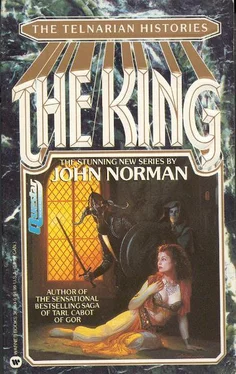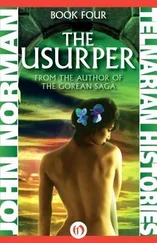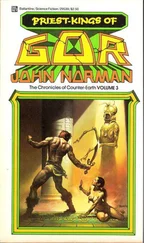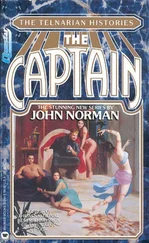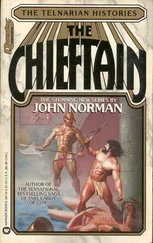Afterward he proceeded to his chambers.
“Let us see if there are men here!” called Abrogastes. “Are there men here?”
“There are men here!” cried the feasters. Drinking horns were lifted.
Greasy hands snatched at slabs of roasted meat, dripping with juices and blood, from heavy, broad, stained wooden trenchers proffered almost frantically by former ladies of the empire, their ankles belled. Behind them, here and there, in colorful garments, in their colorful cloaks, were lads, with switches, whose business it was to see that the former ladies of the empire performed well. Abrogastes, clearing his vision, angry, sat back on the bench, between the high-seat pillars. He was moody, angry. He had drunk too much.
At his right there lay a great hound, of a sort bred for loyalty and suspicion, for ferocity and courage, a dog of the hunt and war, which will defend its master to the last drop of its blood, who will hurl itself at the merest spoken word on even an arn bear or vi-cat, or a dozen armed men, wreaking havoc amongst them.
To his left, at his feet, in a collar, on a chain, there lay a softer pet, one appropriate for other uses.
Abrogastes bent down and put down his hand on the massive head of the hound.
It rumbled, a growl that betokened affection.
“Good lad,” said Abrogastes thickly. He tousled the mane on that great head.
Another hand, so placed, might have been torn from the wrist, with one sudden, unexpected, fierce movement of the great jaws.
Abrogastes straightened up, looked out on the open space, at the serving, and, at the tables along the walls, the feasters.
He then looked down, moodily, angrily, to the left, at the other pet, on its chain.
It put down its head, terrified.
It did not know why it had been brought to this feast.
It dared not put its lips again, timidly, beggingly, placatingly, hopefully, to Abrogastes’ boot.
There was a sound of swearing from one of the tables. Two men pushed back their one-man benches.
“Desist!” cried a fellow.
Blades whipped from sheaths.
One of the former ladies of the empire screamed.
Two men leapt upon the table, scattering flagons and trenchers, and then from it, to the floor, rage in their eyes.
There was a sound of steel.
Then the very ground between the two men erupted upward in a blinding spume of dust, and there was a narrow trench, smoking, between the men.
All eyes turned to Abrogastes who stood before the bench, a smoking pistol in his hand.
“Who is the enemy?” he inquired.
“Milord?” asked one of the men, sword in hand.
“It is not he,” said Abrogastes, pointing to one of the combatants. “Nor he!” he said, pointing to the other.
There was a sound of belled ankles, as ladies of the empire shrank back toward the tables.
“The true enemy,” said Abrogastes, “is the empire.”
The former ladies of the empire, carrying their trenchers, and their flagons, trembled.
There was a tiny sound of bells, as the small feet, bared, of former ladies of the empire stirred on the earthen, rush-strewn floor. Then they tried to stand perfectly still, but, even so, here and there, inadvertently, miserably, a tiny bell would sound.
The lads stood by with their switches.
They grinned at one another.
It would be easy enough to make those bells jangle a merry tune.
“And this, too,” said Abrogastes, lifting the smoking pistol, “is the enemy.’’ He regarded the silent men. “This is an imperial pistol,” he said, “of the sort carried by officers of the mobile forces of the empire.” Abrogastes looked about himself. “And this, I think,” said he, brandishing the weapon, “is the true enemy, the only real enemy-the only enemy to be regarded with respect, with circumspection-the weaponry, the ships, the machines, the technology of the empire.”
He looked again about himself.
“But what if we, too, had such things?” he asked.
Men looked at one another.
“Think on that,” said he.
“But it is not possible,” said a man.
Abrogastes smiled, and resumed his seat.
“Our weapons, milord, have been drawn!” cried one of the paused combatants.
“Then let blood be shed,” said Abrogastes.
“And how shall it be shed?” asked the other.
“As the blood of what we all must be,” said Abrogastes, “as the blood of brothers.”
Both men then slashed their forearms, and stood there, blood flowing down their arms, regarding one another, and then, as one, they sheathed their weapons, not having been drawn without blood being shed. Among the Alemanni and such peoples one does not draw a weapon lightly. Into the sheaths struck the weapons, decisively. The men then approached one another. They held their bleeding, slashed arms together, pressed, the one to the other. Their bloods mingled. Weeping, they embraced, the blood of each on the other. There was cheering from the tables. Both men resumed their seats.
There was the lively sound of switches and the beautiful waitresses, the former ladies of the empire, all of them highborn, and chosen from many for their loveliness, crying out in pain and misery, sped by the impatient lads, their bells jangling, addressed themselves again, and zealously, to their appointed tasks.
“Surely, milord,” said a clerk, a small man, with dark garments, carrying papers, tied with string, and a clerk’s wallet, with its ink flask and sheathed pens, leaning toward Abrogastes, “the time is propitious for the business of the evening.”
Abrogastes lifted his head.
“The colleagues are in a splendid mood,” said the clerk. “They will be receptive to your proposal.”
“It is not time,” said Abrogastes. “You have much to learn, yet, of the ways of the Alemanni, of the Drisriaks.”
The Alemanni nation, as I have mentioned elsewhere, consists of eleven tribes. Representatives of all were present, as well as representatives of many other tribes, and groups, and species. The Drisriaks were the largest and fiercest of the Alemanni tribes. Abrogastes was king of the Drisriaks. The Alemanni nation was indisputably the most powerful of the barbarian nations, particularly since the decimation by the empire of their hereditary enemies, the Vandal peoples. Abrogastes thus, as king of the Drisriaks, occupied a very important position.
“Yes, milord,” said the clerk, withdrawing.
“For what purpose has this feast been called?” asked a nobleman, to the right of Abrogastes, of his fellow, to his own right.
Abrogastes gave no sign that he had heard the question.
“Perhaps to celebrate the victory of the Drisriaks over the Ortungen,” the first nobleman was told.
A son of Abrogastes, one named Ortog, had broken away from the Drisriaks, with loyalties from his own retainers, from those who had taken rings from him, to form his own tribe, the Ortungs, or Ortungen. The Ortungs, and their ships, had been pursued relentlessly, and finally apprehended by Abrogastes, first on, and in the vicinity of, the world we know only by its number in the imperial records, 738.2, and later, others, in the vicinity of another world, one whose location, also, is unknown, a world, however, whose Alemanni name survives, Tenguthaxichai, possibly “Tengutha’s Camp,” or “Tengutha’s Lair.” Tengutha, incidentally, is a common name among several of the barbarian peoples, including the Alemanni. Justice, as viewed by Abrogastes, had been meted out on that world, on Tenguthaxichai.
“I have many sons,” had said Abrogastes. He had then wiped his bloodied knife on his thigh, and returned it to its sheath. His traitorous daughter, Gerune, who had fled the Drisriaks with Ortog, the rebel, had been humbled, disowned, and enslaved. Abrogastes had permitted her to be claimed, and thusly owned, by one whom he had taken to be a tender of pigs.
Читать дальше
